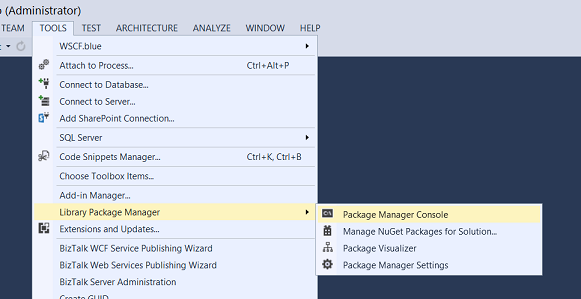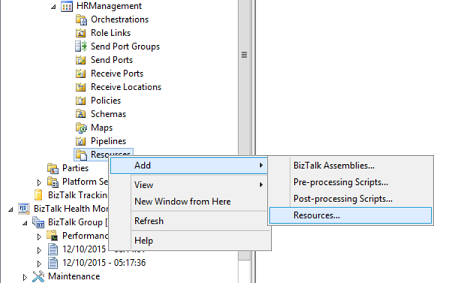Tip 2 - Using Nlog in Biztalk Orchestration
5.00/5 (4 votes)
Use NLog to log messages in biztalk orchestration and save logs to log file
Introduction
This tip provides a simple explanation of how to use NLog for log messages inside biztalk orchestration.
The tip is divided into 4 parts:
- Install NLog for C# application
- Update Biztalk Configuration
- Development
- Configure biztalk administration console [ run sample - get output ]
Getting Started
Part 1: Install NLog for C# Application
- Create new C# application "
HelperLibrary" - Open package manager console:

- Write command:
Install-Package NLog.Config - This will install NLog for the current application.
- Edit on
NLog.Config.<?xml version="1.0" encoding="utf-8" ?> <nlog xmlns="http://www.nlog-project.org/schemas/NLog.xsd" xmlns:xsi="http://www.w3.org/2001/XMLSchema-instance"> <!-- See https://github.com/nlog/nlog/wiki/Configuration-file for information on customizing logging rules and outputs. --> <targets> <!-- local file logging in C:\ Partition--> <target name="TraceFile" xsi:type="File" fileName="C:\logs\BiztalkTraceLogs.log" layout=" -------------- ${level} (${longdate}) --------------${newline} ${newline} Additional Info: ${message}${newline}" /> <target name="ErrorFile" xsi:type="File" fileName="C:\logs\BiztalkErrorLogs.log" layout=" -------------- ${level} (${longdate}) --------------${newline} ${newline} Exception Type: ${exception:format=Type}${newline} Exception Message: ${exception:format=Message}${newline} Stack Trace: ${exception:format=StackTrace}${newline} Additional Info: ${message}${newline}" /> </targets> <rules> <logger name="*" level="Trace" writeTo="TraceFile" /> <logger name="*" levels="Debug,Error" writeTo="ErrorFile" /> </rules> </nlog>
Part 2: Update Biztalk Server Configuration
- Navigate to biztalk folder location in program files
Program Files (x86)Microsoft BizTalk Server 2013 R2 - Open BTSNTSvc64.exe or BTSNTSvc.exe according to version of biztalk and update file
<?xml version="1.0" ?> <configuration> <startup useLegacyV2RuntimeActivationPolicy="true"> <supportedRuntime version="v4.0" /> </startup> <!-- 1. add config Section for NLog --> <configSections> <section name="nlog" type="NLog.Config.ConfigSectionHandler, NLog"/> </configSections> <runtime> <assemblyBinding xmlns="urn:schemas-microsoft-com:asm.v1"> <probing privatePath="BizTalk Assemblies;Developer Tools;Tracking;Tracking\interop" /> </assemblyBinding> </runtime> <system.runtime.remoting> <channelSinkProviders> <serverProviders> <provider id="sspi" type="Microsoft.BizTalk.XLANGs.BTXEngine. SecurityServerChannelSinkProvider,Microsoft.XLANGs.BizTalk.Engine" securityPackage="ntlm" authenticationLevel="packetPrivacy" /> </serverProviders> </channelSinkProviders> <application> <channels> <channel ref="tcp" port="0" name=""> <serverProviders> <provider ref="sspi" /> <formatter ref="binary" typeFilterLevel="Full"/> </serverProviders> </channel> </channels> </application> </system.runtime.remoting> <!-- 2. Call NLog.config --> <nlog file=" NLog.config" /> </configuration> - Copy NLog.config file to biztalk server location
Program Files (x86)Microsoft BizTalk Server 2013 R2
Part 3: Development
- Add NLogManager.cs Class to
HelperLibraryC# application:using NLog; using System; using System.Collections.Generic; using System.Linq; using System.Text; using System.Threading.Tasks; namespace HRManagement.HelperLibrary { [Serializable()] public static class NLogManager { private static readonly Logger logman = LogManager.GetCurrentClassLogger(); public static void Log(LogType level, string message, Exception exception) { switch (level) {s case LogType.Error: logman.Log(LogLevel.Error, exception , message , null); break; case LogType.Info: logman.Log(LogLevel.Info, exception, message, null); break; case LogType.Warning: logman.Log(LogLevel.Warn, exception, message, null); break; case LogType.Trace: logman.Log(LogLevel.Trace, exception, message, null); break; } if (exception.InnerException != null) { Log(level, message, exception.InnerException); } } public static void Log(LogType level, string message) { switch (level) { case LogType.Error: logman.Log(LogLevel.Error, message); break; case LogType.Info: logman.Log(LogLevel.Info, message); break; case LogType.Warning: logman.Log(LogLevel.Warn, message); break; case LogType.Trace: logman.Log(LogLevel.Trace, message); break; } } } [Serializable()] public enum LogType { Error, Info, Warning, Trace } } -
Build
HelperLibraryand deploy to GAC, deploy helper to gac like Tip1-Add_Dll_To_Gac. -
Add biztalk application + add reference for
helperLibrary. -
Create new sample schema to route using orchestration
[EmployeeSchema] - Create your sample orcestration [simple for receive - write log - send]
- Call
HelperLibraryto useNLogManagerClass to start log and specifyLogType[Sample Trace] - Deploy Biztalk Application [add strong key + deploy]
Part 4: Configure biztalk Administration Console [Run Sample - Get Output]
- Bound orchestration, create physical receive, send ports
- Add resources of nlog, helper DLL

- Route messages [Employee Schema] from receive to send port
- Get Results in
sendPort, you find the log [BiztalkTraceLogs.txt] in folder specified inNLog.Config[c:\logs\] - Finally, you can add more logs for any shape in orchestration, and enjoy logs types and collect all logs into one file or multiple according to configuration in
NLog.config.
